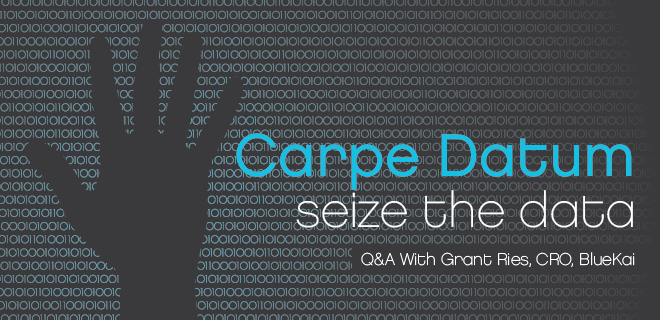
It feels as if data management platforms have crossed threshold from “handy tool, nice if you can afford it” to “must-have-now” for both media sellers and buyers. The platforms were quite the talk of OPS Markets in NYC last month, where questions about what to do with the data pileup were debated from the top of the day. The event featured not one but two Focus On sessions devoted to the topic: Paul Dolan, North American Managing Director for Xaxis, discussed the idea of affinity tiers for breaking up marketer audiences while Vikram Somaya, Vice President of Global Operations and Audience for Thomson Reuters, detailed building a DMP in-house that stretched across all aspects of the publisher’s business.
All kinds of companies are boarding the DMP train, including consumer data aggregation and marketing companies like V12 Group, which recently named BlueKai its exclusive DMP provider. We caught up with BlueKai CRO Grant Ries to get more details about the expanded partnership with V12 as well as how publishers and agencies are evolving in their use of data management tools.
What’s the advantage of partnering with a company like V12? How does this new deal expand on your existing partnership?
As a data management platform (DMP) provider, we want to provide the platform technologies that can support our customer’s growing and evolving data strategies. For V12, it was important for them to select a DMP that supported the various channels in which they were monetizing their data asset. They started out by making their audience data available via the BlueKai Exchange, but soon found that they wanted a platform to support the creation and delivery of customized advertiser offerings.
Our DMP is designed in a way that makes this easy. It’s all about having all your data assets in one place – then having the control to share varying datasets with different constituents.
What other kinds of companies are you looking to partner with these days to expand your offerings? How has this changed in the last year?
Our DMP business is growing faster than we expected. Our solution was geared towards marketers and agencies when we first launched late last year, but the demand has really expanded beyond this group. We’ve since signed with large content publishers, e-commerce sites, as well as data aggregators like V12. We find that the BlueKai DMP is flexible enough to be applied to really any business who needed help with collecting, analyzing and activating their proprietary first party data asset.
In addition, we know that data intelligence can be used beyond just ad targeting (which is the lowest-hanging-fruit use case), so we’ve started partnering aggressively with companies who can offer additional value-add solutions on top of the BlueKai platform. For example, how can your data be used to better inform attribution models, site content optimization, etc. We know there are niche experts in those areas and we are integrating with them so that marketers and publishers can activate their data in the easiest way possible.
How has BlueKai developed its various products over the last year? Where’s the biggest focus for you at the moment – buy or sell side?
We’ve focused on three core areas that benefit the buy and sell side: getting data in, making sense of it and activating the data into execution platforms. More specifically this translates into the following areas: driving the most efficient loss-less data transfer, providing deeper media analytics and look-alike modeling, giving proprietary data creators more types of permissions and controls over how data is share, deepening our tag management stack and driving integrations with all execution platforms in the ecosystem.
How do you see publisher adoption of data management platforms changing the data game in the near future? How about their use of third-party data?
I think that publisher adoption of DMPs means that they can now be assured that they are in control of their own data and their monetization destiny. With a data platform, they can monetize audience data in various ways to optimize for higher ad revenues. The key use cases that we see are:
- Data centralization (across online properties or from offline to online)
- Audience segmentation (building audiences that takes the best of their first-party data and add third party data to create non-endemic audience offerings or to increase scale on existing offerings)
- Audience analytics – enabling them to better understand the profiles of their visitors beyond actions taken on their own properties
- Extending audience reach – ability to set up an off-site network to target audiences beyond their own properties
There’s still a lot of data out there and a whole lot of demand, but do you see a point of consolidation among data providers in the future? What could happen to streamline the space?
I do think that data brands that are known like BlueKai, will have an advantage in a world where there are too many options. Our goal is to become a central integration point for the entire data ecosystem. This is important because it means that a marketer or publisher can choose one major data platform and through that get access to all the best data and all the best partners. Without this a marketer or publisher will be overwhelmed and over worked.
So consolidation – in this sense – doesn’t meant that BlueKai goes out and acquires 10 companies. Rather it means we stay open and nimble and offer a central integration point.
What are your thoughts on recently laid out online privacy recommendations by the FTC? Are you nervous about legislation? (Maybe you’re just shivering a little bit…)
Since day one, BlueKai has operated our business with consumer transparency as a top priority. We were one of the first companies to roll out a consumer registry, where people can see what anonymous data (now an industry standard) is being collected and has always made data practice decisions on how it impacts the consumer first. We are very engaged with the DAA self-regulatory programs and we commend them for the progress they have made.
There is still a lot be fleshed out on the legislative front, but I am confident the industry and the government will come to a solution that supports the thriving economy created by the media industry, balanced with fair practices that protect and informs the consumer.
 |
Get the latest on all things premium at OPS London, which will bring EU digital advertising leaders and ops professionals together to discuss and develop best practices for operational excellence. Register today for OPS London, which will be held May 15, 2012. |